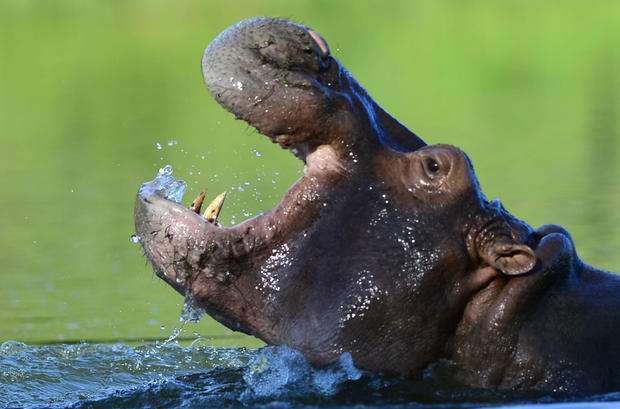A hippo descended from animals smuggled into Colombia by the late drug kingpin Pablo Escobar has died after colliding with an SUV on a highway near Escobar’s hacienda town, environmental authorities said Wednesday.
so called “Cocaine Hippos,” which spread from the estate to nearby rivers and now The number is more than 100, have no natural predators in Colombia and have been declared an invasive species that could disrupt the ecosystem. The accident late Tuesday reflected the added danger that hippos, which weigh up to 2 tons, can pose to motorists.
The occupants of the car were unhurt in the crash northwest on a highway from Bogota to Medellin, police said. The hippopotamus died immediately afterwards and was removed for analysis, environmental authorities said.
Raul Arboleda/AFP via Getty Images
“This is one of the dangers that the presence of this species represents. Many of them cross highways where there is a lot of traffic, which is also a danger to people,” said David Echeverri Lopez, a biologist at the local environmental authority Corner.
“Hippos are unpredictable, at any moment they can attack a person,” he added.
A group of them were brought to Hacienda Nápoles, Escobar’s private zoo in the 1980s, which became a tourist attraction after his death in 1993. Residents of nearby Puerto Triunfo have become accustomed to sometimes freely roaming the town.
Native to Africa, hippos were declared invasive in Colombia last year, and environmental officials say their population could increase to 400 in eight years. Most hippos live freely in rivers and breed without regulation.
Colombia has proposed relocating at least 70 animals to India and Mexico to control their population. Last month, officials said it would cost approx $3.5 million in deportations the hippopotamus
Scientists warn that hippo excrement changes the structure of rivers and can affect the habitats of manatees and capybaras.
Independent journalist Audrey Huse, who has lived in Colombia for eight years, told CBS News last month that in the 1980s, Escobar imported just four hippos — and now has about 150 of them.
“Because they have no natural predators here, as they would in Africa, the population is increasing and that’s affecting the local ecosystem,” Huss said. “Because they are such large animals, they consume substantial amounts of grassland and produce significant waste, which poisons rivers.”
As a result, hippos kill fish and threaten native species such as manatees, otters and turtles, he said.
In 2021, after the Colombian government was sued for planning to sterilize or kill the animals, a The federal court ruled While hippos may be recognized as people or “persons of interest” with legal rights in the United States, that order carries no weight in Colombia, where the hippos live, a legal expert said.
The area they roam is a paradise for the animals, which have no predators and not enough food and water, CBS News correspondent Manuel Bojarquez Reported in 2019. Locals call them “village pets,” but a local biologist told Bojorquez that they are nothing more than “endangered” and “territorial” species.
Alvaro Molina, 57, says he supports hippos – even though he is one of the few Colombians who has been attacked by one. He was out fishing one day when he felt a movement under his canoe that threw him into the water.
“The female attacked me once – the first pair that came – because she had recently given birth,” he said.
Locals say hippos sometimes come out of the water and walk through the streets of the city. When this happens, traffic stops and people get out of their way.

